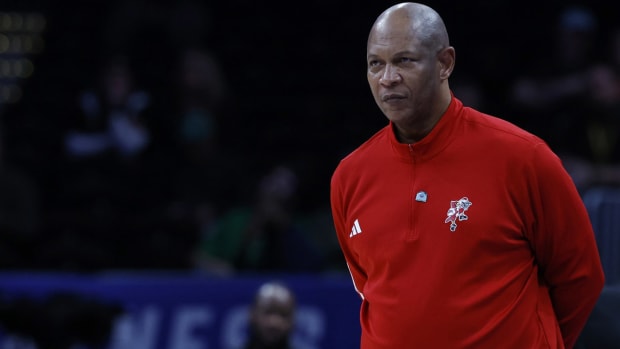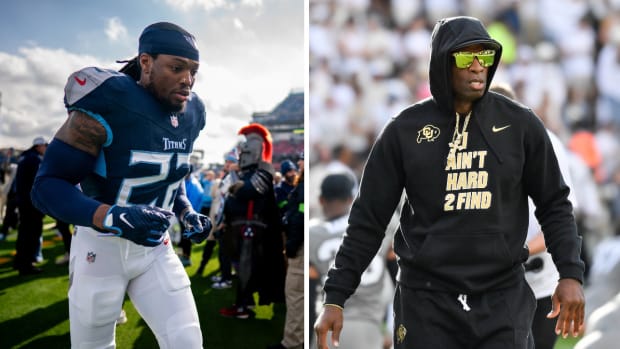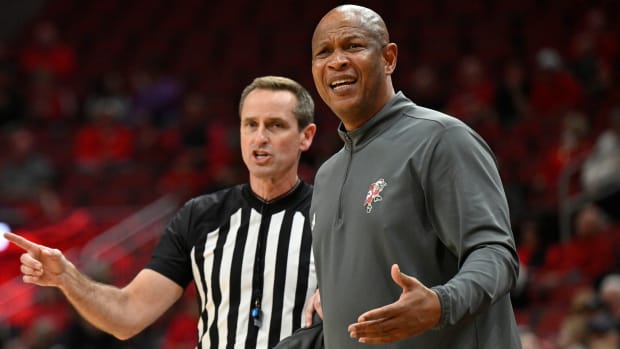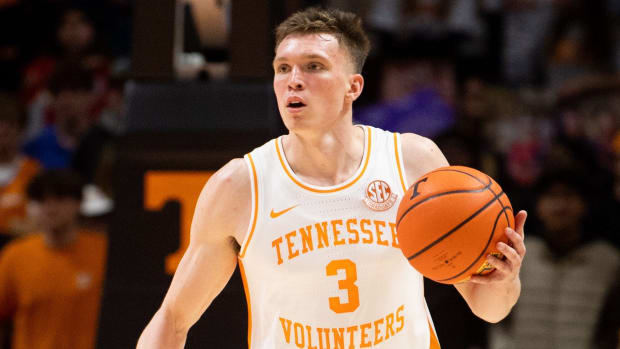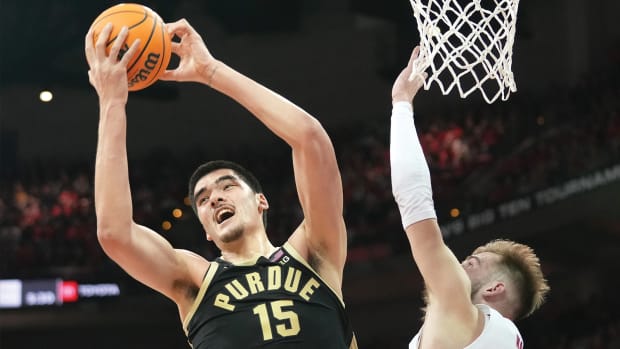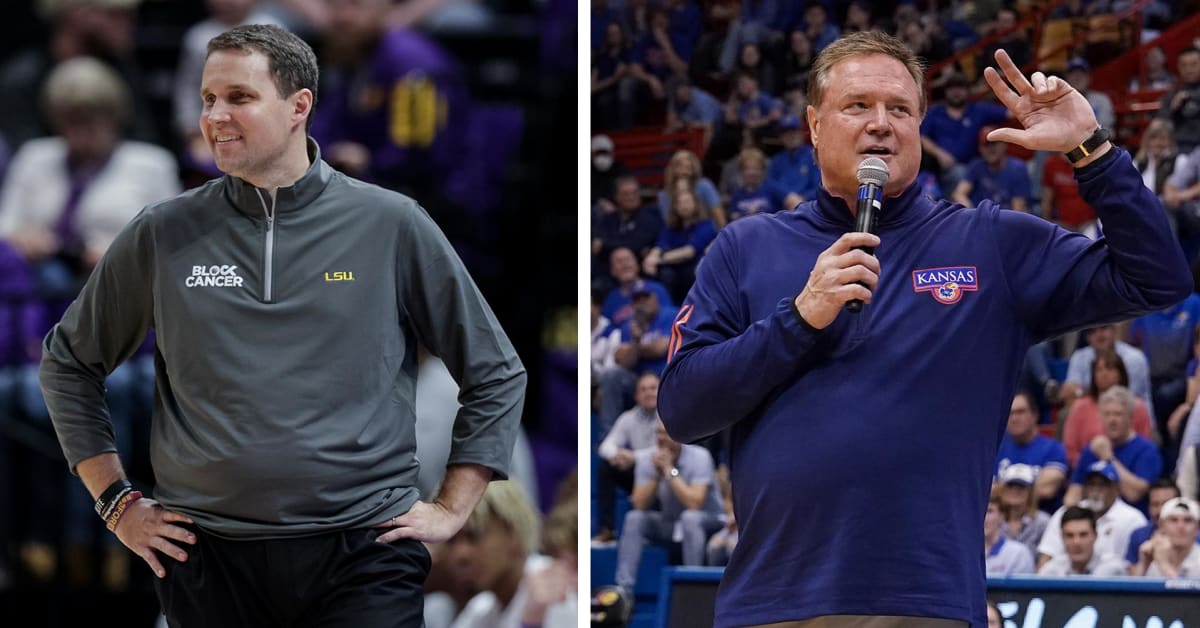
Sources: Kansas, LSU Complete Hearings for Corruption Cases in Front of NCAA Panel
The Independent Accountability Review Process, created by the NCAA in 2019 as an “off-ramp” for complex and contentious rules infraction cases, has just two jobs left before being shut down: handing down rulings to Kansas and LSU.
Multiple sources told Sports Illustrated that both schools have had their hearings in front of the Independent Resolution Panel. Kansas went before the IRP for three days last weekend, sources said, while LSU’s hearing was in February. If timelines from previous cases hold, with roughly four months between hearing and ruling, LSU’s case could wrap in late spring or early summer, while Kansas’ could conclude by late summer.
Regardless, both schools should be apprised of sanctions—if there are any—before the 2023–24 seasons begin for their affected sports. (Football and men’s basketball for LSU, only men’s basketball for Kansas.) There is no appeal process within the IARP, so those rulings will be final.
Once they are rendered, that will be the final act for the IARP—an entity that has been heavily criticized within the NCAA membership for being slow, costly and soft in terms of applying penalties. The NCAA announced last August that it would shut down the IARP when its current caseload expired. After ruling on men’s basketball cases involving North Carolina State, Memphis, Louisville and Arizona, all that remained were LSU and Kansas.
The Tigers and Jayhawks can hope that the Independent Resolution Panel’s history of light penalties is maintained. Both schools face potential postseason bans, but the IRP did not apply that penalty in any of its previous four cases. Furthermore, it handed down no major sanctions to the head coaches of the involved schools. The IRP has shown a precedent for lessening the severity of some charges that were brought by investigators; it is unclear whether that’s happened in either the LSU or Kansas cases.
Both the LSU and Kansas basketball allegations had their roots in the FBI’s 2017 investigation of corruption within the sport.
LSU was charged by investigators with eight Level I violations—the most severe in the NCAA’s violation hierarchy—with six of those violations pinned solely on basketball and one on football. The eighth Level I allegation, lack of institutional control, was for the combined violations in both sports. Former LSU basketball coach Will Wade was charged with six violations, five of them Level I and one Level II, for his role in alleged widespread cheating within his program.
Among other alleged violations, Wade was caught on FBI wiretaps discussing a “strong-ass offer” to prospect Javonte Smart’s family with aspiring agent Christian Dawkins. Dawkins wound up doing time in federal prison for his role in the corruption scandal.
Wade was fired by LSU in March 2022, shortly after the notice of allegations was received. The grounds for his dismissal were written into an amended contract he agreed to three years earlier, which gave LSU latitude to fire Wade for cause if he were charged with any Level I or Level II violations.
Wade subsequently was hired by McNeese State last month. The school did not disclose it at the time of Wade’s hiring, but he agreed to a five-game suspension to start the 2023–24 season, as well as various recruiting restrictions. The IRP could apply significantly greater sanctions—including a multiyear show-cause penalty that could make McNeese’s hiring of Wade a major mistake—but previous coaches who faced significant charges escaped the IRP virtually unscathed. They include Sean Miller (then at Arizona, now at Xavier), Rick Pitino (then at Louisville, later at Iona and now at St. John’s) and Penny Hardaway (then and now at Memphis).
Kansas coach Bill Self and assistant Kurtis Townsend also could be facing major sanctions, depending on the IRP ruling in their case. Self and Townsend were named in a notice of allegations that charged Kansas with five Level I violations. Among the violations were payments from Adidas bag man T.J. Gassnola to people associated with Jayhawks Billy Preston and Silvio De Sousa. The fact that Louisville and North Carolina State escaped major sanctions related to similar Adidas-funded impermissible benefits could be a positive precedent for Kansas.
However, the school has acknowledged some wrongdoing without getting into specifics. After Kansas initially rebuked the allegations and even awarded Self a so-called “lifetime contract,” it changed course in November and suspended both Self and Townsend for the first four games of the 2022–23 season. The two also were given recruiting restrictions by the school.
"We are hopeful these difficult self-imposed sanctions will assist in bringing the case to a conclusion," Kansas athletic director Travis Goff said at the time the suspensions were announced.
That case and LSU’s are on a path toward conclusion in the coming months. And after that, the IARP will cease to exist.
Information from SI’s Ross Dellenger was used in this report.



